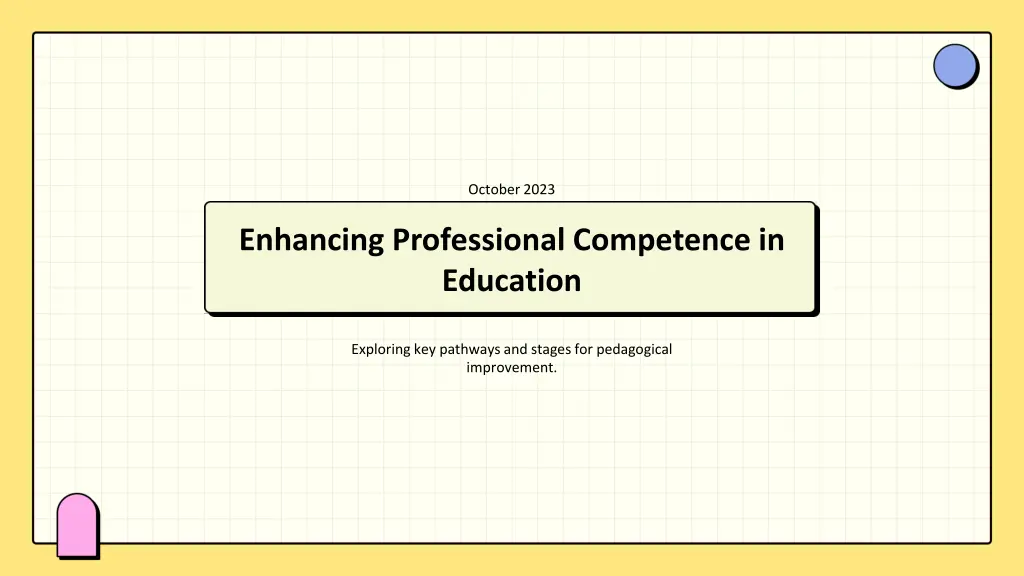
Enhancing Professional Competence in Education: Exploring Pathways for Growth
Discover the importance of professional competence in education and explore key stages for pedagogical improvement. Empower educators, master competence, and enhance growth through strategies for continuous learning and skill development. Unlock the journey from unconscious incompetence to conscious competence.
Download Presentation

Please find below an Image/Link to download the presentation.
The content on the website is provided AS IS for your information and personal use only. It may not be sold, licensed, or shared on other websites without obtaining consent from the author. If you encounter any issues during the download, it is possible that the publisher has removed the file from their server.
You are allowed to download the files provided on this website for personal or commercial use, subject to the condition that they are used lawfully. All files are the property of their respective owners.
The content on the website is provided AS IS for your information and personal use only. It may not be sold, licensed, or shared on other websites without obtaining consent from the author.
E N D
Presentation Transcript
October 2023 Enhancing Professional Competence in Education Exploring key pathways and stages for pedagogical improvement.
Table of Contents 5 Future Directions in Education 1 Empowering Educators 2 Mastering Competence: A Journey Empowering Growth: Strategies for Competence Enhancement 3 Benefits of Improved Competence 4
Empowering Educators 1.What is Competence? 2.Impact on Learning Professional competence refers to the knowledge, skills, and attitudes educators must develop to effectively teach and support student learning. It encompasses a variety of competencies... Understanding professional competence is crucial for educators as it educators as it directly impacts student learning outcomes. Competent educators can create engaging learning environments and environments and foster student growth,... 3.Skills Development 4.Building Confidence Developing professional skills is vital for educators in adapting to adapting to diverse learning needs. Continuous professional development helps educators stay updated with teaching strategies, strategies, enhancing their... Building confidence in educators increases their effectiveness in the effectiveness in the classroom. When educators are competent, they competent, they feel more secure in their teaching abilities, which which positively influences...
Mastering Competence: A Journey Stage 1 Unconscious Incompetence In this initial phase, individuals are unaware of their lack of skills. They do not recognize the need for improvement, often resulting in mistakes and misunderstandings. Explore the stages leading to professional competence competence development. Understand how individuals individuals evolve through learning and experience to to achieve expertise. Stage 2 Conscious Incompetence At this stage, individuals become aware aware of their deficiencies. They realize realize what they need to learn, prompting a desire for improvement and improvement and skill development through education or practice. Stage 3 Conscious Competence Here, individuals can perform tasks successfully but must think through the process. Awareness of skills leads to more deliberate practice, refining their abilities toward proficiency.
Empowering Growth: Strategies for Competence Enhancement 1. Continuous learning is essential for professional growth. Engaging in courses, workshops, and certifications provides updated knowledge and skills necessary in today's fast-paced work environment. 2. Networking and collaboration with peers can spark innovative ideas and solutions. Engaging in professional associations and attending conferences can broaden exposure to best practices and new trends. 3. Utilizing feedback is a powerful tool for improvement. Regularly seeking constructive criticism from mentors and colleagues fosters self-awareness and encourages targeted skill development. 4. Establishing personal development goals helps in maintaining focus on professional growth. By creating actionable plans and regularly reviewing progress, individuals can achieve significant career advancements.
Benefits of Improved Competence Advantages for Educators Advantages for Students Improved competence enhances educators' confidence, enabling them to teach more effectively and engage students students better. Students benefit from enhanced educational experiences as experiences as educators apply advanced techniques and and knowledge gained from improved competence. Educators with higher competence levels can adapt their teaching methods to accommodate diverse learning styles, leading to improved student outcomes. Improved competence generates enthusiasm and motivation among students, likely boosting their interest and participation in the learning process. Continuous improvement of competence fosters a culture of lifelong learning among educators, positively influencing their professional development. Increased competence among educators often leads to better assessment and feedback methodologies, supporting students' academic growth.
Future Directions in Education 30% Online Learning Growth 25% Skill-Based Training 15% AI Integration 40% Collaboration Tools
